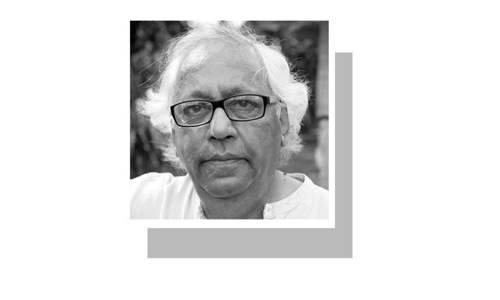OBITUARY: Irfan Husain: an eclectic who lived life to the fullest

I FIRST met Irfan Husain sometime in early 1982 when he walked into my office at The Star and with a wide grin introduced himself as “Ferida Sher’s ghost”. He had recently started writing a weekly column for The Star — satirical and critical of the Zia regime — and being a government official could not write under his own name. He chose to write under his (then) wife’s name, much to her annoyance! However, as the censors grew more and more ham-handed, Irfan had to keep changing his byline – in fact, his was the most frequently changed byline in those harsh days of military dictatorship.
It was difficult blue-pencilling Irfan’s writing. He would resist forcefully and we would argue back and forth. Sadly, his battle with internal censorship continued till the end as Dawn would sometimes drop his Saturday column that he would then share with close friends. In fact, when his column didn’t appear on a Saturday, most of us believed censorship had struck again and it was only later in the day that I was informed of his hospitalisation.
It’s somewhat of a cliché to say about those who have passed away that they had led a full life. However, Irfan’s life truly epitomised that description. Born into a family where reading, discussions, culture and, above all, tolerance, were encouraged, Irfan had an eclectic taste in art, music and books. He had the opportunity to study in Paris and Ankara, apart from Karachi. As well as imbibing knowledge and experience, he made lasting friends everywhere. His father, Akhtar Husain Raipuri, a noted literary figure and his mother, Hamida, who became a writer in her own right, kept an open house where good food and ideas were generously shared.
An epicure as well as an experimental cook, Irfan introduced me to several eateries and cuisines. Whether it was Korean food at Café Grand, leg of lamb at Qaiser’s, chullu kebab from Tariq Road or a roadside dhaba where port workers dined, he relished sharing the flavours as well as the ambience, rudimentary as they were, with good friends. At home in Karachi, it became a tradition for him to host a dinner for family and friends at Thanksgiving for which he would prepare the turkey himself. And when Irfan started writing food reviews, he became a much sought after diner at the city’s fancier restaurants.
As far as I know, Irfan’s advent into journalism started from Outlook, I.H. Burney’s trailblazing weekly that started publication sometime in the late sixties. The weekly’s strong critical position on the rulers’ shenanigans suited Irfan’s own attitude to those in power. He never opted to write for those publications he saw as being soft on the power-wielders, military or civilian. Though a supporter of Benazir Bhutto, he was scathing in his criticism of her inept government and was quite tickled to know, through the grapevine, that the prime minister did not expect such censure from him.
Irfan began writing for Dawn initially under the byline, Mazdak, and years later under his own. Never one to mince his words, his columns evoked strong reactions. Hugely popular with some, he attracted enough hate mail to make his friends fear for him. Apart from his weekly column, he often shared his cooking explorations with the readers.
He wrote for Dawn for over 20 years, never missing a deadline. However, his journalistic commitments left him time only to write one book, Fatal Faultlines, Pakistan, Islam and the West published in 2012. In this book, he sought to answer the question many in the west asked about Muslims, “why do they hate us?”
Irfan’s professional career was as varied as his tastes in art, music and culture. He served as culture secretary during Benazir Bhutto’s first government. This was followed by a short stint in diplomacy in Washington when he was appointed information minister. However, he truly enjoyed his time as president of the Textile Institute of Pakistan. Set up by textile tycoons, Irfan saw the project as a challenge to inculcate thinking and questioning among young people. He persuaded Dr Eqbal Ahmed to accept the position of vice chancellor and together they succeeded in turning TIP into an institute of excellence.
Born in 1944 in Amritsar, Irfan was a citizen of the world. Busy with professional commitments he, nevertheless, found time for his wide circle of friends and family. He doted on his son, Shakir with whom he enjoyed great camaraderie, and on his two grandsons. His wife, Charlotte, as warm-hearted as Irfan, welcomed all his friends into their home — in Sri Lanka or in England. His wit, intellect and companionship will be deeply missed by all those close to him.
Published in Dawn, December 17th, 2020













































